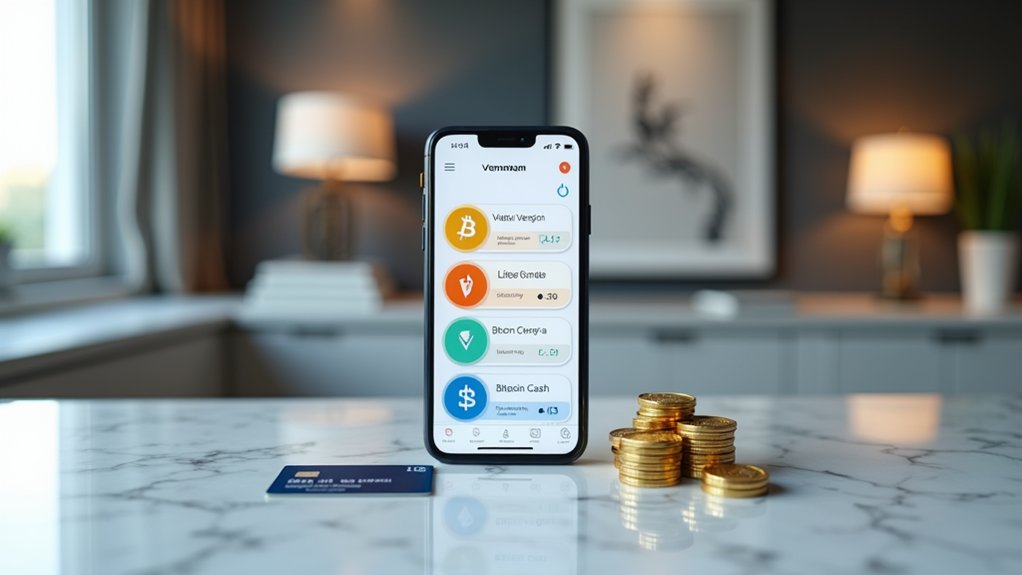Several financial institutions now facilitate cryptocurrency transactions, though with varying policies. Traditional banks like JP Morgan and Bank of America generally permit transfers to regulated exchanges but restrict direct credit card purchases. Digital-first alternatives like Revolut, Monzo, and Mercury offer more extensive crypto services with enhanced functionality. Specialized entities including Metropolitan Commercial Bank ("The Crypto Bank") and Customers Bank provide institutional-grade crypto solutions. Investors seeking crypto exposure without direct ownership can access crypto-backed financial products through institutions like Ally Bank. Further exploration reveals additional specialized services and regional variations.

While the cryptocurrency market continues to progress within the mainstream financial ecosystem, traditional banking institutions have developed varying approaches to digital asset incorporation, creating a complex landscape for consumers and businesses seeking to participate in crypto transactions.
Major financial institutions like Bank of America, Citibank, Wells Fargo, and JP Morgan exhibit cautious assimilation, permitting crypto transfers to regulated exchanges while maintaining restrictions on direct cryptocurrency purchases through credit cards. JP Morgan has demonstrated institutional engagement through its proprietary Onyx blockchain platform and JPM Coin, despite its CEO's widely-documented skepticism regarding mainstream digital currencies.
Traditional banks navigate crypto's complexities with cautious policies while simultaneously exploring blockchain technology internally.
Digital-first banking alternatives have emerged as significant facilitators of cryptocurrency adoption, with entities such as Revolut, Monzo, Mercury, and Wirex offering more seamless amalgamation between traditional banking services and digital asset ecosystems. Mercury stands out as the best overall crypto-friendly bank with a 4.34 out of 5 rating and FDIC insurance coverage up to $5 million through partners.
These institutions typically provide specialized features including international crypto transfers, multi-currency functionality, and direct exchange partnerships, serving tech-savvy consumers seeking greater financial flexibility. BankProv stands out among these offerings with its business-focused solutions, including Ethereum-backed loans and specialized API banking services for institutional clients.
The institutional custody sector represents another vital development in crypto banking, with established entities like U.S. Bank, Custodia Bank, and Goldman Sachs creating sophisticated frameworks for digital asset management alongside traditional securities. These institutions prioritize compliance with regulations while still offering innovative cryptocurrency services to their clients.
These services primarily target institutional investors and high-net-worth individuals requiring secure, compliant custody solutions that bridge conventional and digital finance. Customers Bank has pursued innovative partnerships with major cryptocurrency exchanges, offering tokenized real-time payment solutions through its CBIT platform.
For consumers seeking exposure to cryptocurrencies without direct ownership, several banking institutions now provide crypto-backed financial products, including Ally Bank's support for investment vehicles like the Grayscale Bitcoin Trust.
Metropolitan Commercial Bank has positioned itself distinctively as "The Crypto Bank," specializing in institutional partnerships within the digital asset space, illustrating how traditional banking entities continue adapting to cryptocurrency incorporation while maintaining regulatory compliance within an evolving financial landscape.
Frequently Asked Questions
Are There Transaction Limits for Crypto Purchases Through Banks?
Transaction limits for crypto purchases vary based on payment method and institution.
Card transactions typically cap at $1,200 per transaction, while ACH and wire transfers allow up to $25,000.
Open Banking permits $5,000, and Pay to Card accommodates $10,000 per transaction.
Verification levels greatly impact these thresholds, with higher tiers releasing increased limits.
Financial institutions calculate limits using USD equivalents and enforce rolling daily or monthly restrictions across all transaction types.
What Fees Do Banks Charge for Cryptocurrency Transactions?
Banks typically impose several fee structures for cryptocurrency transactions, including network transaction fees that vary with blockchain congestion, wire transfer fees averaging 1% after KYC verification, and custody platform charges that may reach $125 per withdrawal.
Additional costs include Lightning Network processing fees (0.1% for Bitcoin), staking commissions ranging from 26.3% to 35%, and potential ATM/debit card fees imposed by operators rather than the institutions themselves.
How Quickly Do Bank-Approved Crypto Purchases Process?
Bank-approved cryptocurrency purchases process at varying speeds depending on payment method and verification requirements.
Debit/credit card transactions typically settle instantly or within minutes through pre-authorization, while bank transfers (ACH/EFT) require 1-5 business days for clearance.
First-time transactions may experience additional delays due to KYC/AML compliance protocols.
Network congestion and blockchain confirmation requirements—ranging from minutes for XRP to days for high-security assets—further influence processing timelines.
Can I Use My Bank's Mobile App for Crypto Trading?
Many financial institutions now offer crypto trading functionality through their mobile apps, enabling users to purchase, sell, and manage digital assets alongside traditional banking services.
Platforms like Revolut, Wirex, and Cash App have integrated crypto capabilities, although features vary considerably between providers.
Most crypto-friendly banking apps incorporate security measures like SSL encryption and two-factor authentication, while some additionally provide educational resources and yield-generating opportunities, including staking and interest-earning programs for cryptocurrency holdings.
Does Using a Bank for Crypto Purchases Affect My Credit Score?
Purchasing cryptocurrency through banking channels does not directly impact credit scores, since these transactions are not reported to credit bureaus.
However, indirect effects may arise if individuals use credit cards for crypto acquisitions, which can increase utilization ratios and potentially trigger cash advance fees.
Financial experts advise maintaining crypto investments separate from credit-based funding sources, because volatility in cryptocurrency markets could compromise one's ability to service existing debt obligations, subsequently affecting payment history components of credit profiles.









